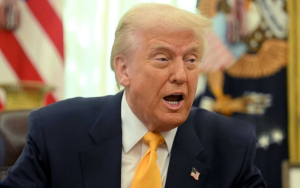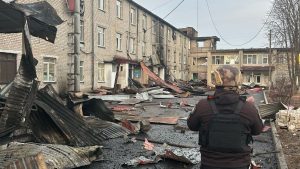The Trump administration hints at future U.S.-Russia economic cooperation.
Others are reading now
The White House said on Monday that economic partnerships with the United States could be part of a future deal with Russia—if Moscow agrees to a ceasefire in Ukraine.
Speaking at a press briefing, White House Press Secretary Karoline Leavitt said,
There is an incentive for Russia to end this war and perhaps that could be economic partnerships with the United States. But we need to see a ceasefire first.
Her comments followed a meeting between President Donald Trump’s special envoy, Steve Witkoff, and Russian President Vladimir Putin in St. Petersburg on April 11.
Also read
The talks were described as “productive,” with both sides reportedly exploring ways to bring the war to a close.
Ceasefire First, Then Talks on Trade
While Leavitt didn’t provide details about what kind of economic cooperation might be on the table, she stressed that the administration is not ready to negotiate anything until the fighting stops.
“The president and the presidential envoy, Witkoff, made that very clear to the Russians,” she said.
The Trump administration has made it known that it’s open to rethinking U.S.-Russia relations, but only under the right conditions.
Since taking office in January, President Trump has prioritized normalizing ties with Moscow, including a focus on commercial opportunities.
After a phone call between Trump and Putin on March 18, the White House released a statement saying the two leaders discussed “mutually beneficial cooperation” in several sectors and agreed there is “huge upside” to improving relations.
Witkoff: War Resolution Could Open Economic Doors
In an interview with Fox News, Steve Witkoff hinted at what the administration sees as possible benefits of peace.
I see a possibility of reshaping the Russian-United States relationship through some very compelling commercial opportunities,” he said. “That gives real stability to the region too.
According to Fox News, Witkoff’s meeting with Putin included discussions about the future of five key territories: Crimea, Donetsk, Luhansk, Zaporizhzhia, and Kherson.
These areas are either fully or partially occupied by Russia, and any deal will likely hinge on their status.
Despite the diplomatic push, Russia continues its military campaign in Ukraine.
On Palm Sunday, Russian forces launched a deadly missile strike on the city of Sumy, killing 35 people and injuring 117, according to Ukrainian officials. The attack hit residential areas, schools, and a local cultural center, drawing condemnation from Ukrainian President Volodymyr Zelensky and further complicating peace efforts.



